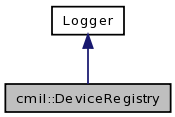
#include <InputDevice.h>
Inheritance diagram for cmil::DeviceRegistry:

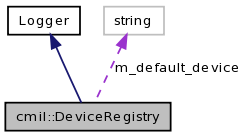
Public Types | |
| typedef std::vector< InputDevice > | DeviceMultiple |
| This type defines the structure of the registry. | |
| typedef std::map< const std::string, DeviceMultiple > | DeviceIndex |
| This type defines the structure of the registry. | |
Public Member Functions | |
| DeviceRegistry () | |
| void | cleanup () |
| This unallocates memory. | |
| void | clear () |
| virtual | ~DeviceRegistry () |
| virtual std::string | getName () const |
| void | registerDevice (InputDevice &dev) |
| This function should "copy" the device into the registry. | |
| void | mergeRegistry (DeviceRegistry ®) |
| This registers each device from the passed registry to this one. | |
| void | SetInputIDs (InputDevice &dev) |
| int | getSize () const |
| std::string | getDefaultDevice () const |
| InputData *const | getData (unsigned int id) const |
| InputData *const | getData (const Ev &event) const |
| int | getID (const Ev &event) const |
| void | integrityCheck () const |
Private Member Functions | |
| void | copyDevice (InputDevice &dev) |
Private Attributes | |
| DeviceIndex | m_index |
| std::string | m_default_device |
| std::vector< InputData * > | m_inputs |
| This is used for fast access of the InputData associated with an ID. | |
Definition at line 197 of file InputDevice.h.
| typedef std::map<const std::string, DeviceMultiple> cmil::DeviceRegistry::DeviceIndex |
| typedef std::vector<InputDevice > cmil::DeviceRegistry::DeviceMultiple |
| cmil::DeviceRegistry::DeviceRegistry | ( | ) | [inline] |
| virtual cmil::DeviceRegistry::~DeviceRegistry | ( | ) | [inline, virtual] |
| void cmil::DeviceRegistry::cleanup | ( | ) |
This unallocates memory.
Definition at line 464 of file InputDevice.cpp.
References getSize(), Logger::log_debug(), and m_index.
Referenced by cmil::InputArbitrator::~InputArbitrator().
00464 { 00465 log_debug("cleanup()"); 00466 std::cout << "registry size: " << getSize() << std::endl; 00467 DeviceIndex::iterator di_iter; 00468 DeviceMultiple::iterator dm_iter; 00469 for(di_iter = m_index.begin() ; di_iter != m_index.end() ; ++di_iter) 00470 for(dm_iter = di_iter->second.begin() ; dm_iter != di_iter->second.end() ; ++dm_iter) { 00471 log_debug("calling dm_iter->cleanup()"); 00472 dm_iter->cleanup(); 00473 } 00474 };
Here is the call graph for this function:

Here is the caller graph for this function:

| void cmil::DeviceRegistry::clear | ( | ) |
This clears the device registry. Care with this must be taken because the memory (InputData) left by the devices will remains allocated.
Definition at line 453 of file InputDevice.cpp.
References getSize(), Logger::log_debug(), and m_index.
Referenced by cmil::SDL::SDLControllers::getDevices(), cmil::SDL::SDLMice::getDevices(), and cmil::SDL::SDLKeyboards::getDevices().
00453 { 00454 log_debug("cleanup()"); 00455 std::cout << "registry size: " << getSize() << std::endl; 00456 DeviceIndex::iterator di_iter; 00457 DeviceMultiple::iterator dm_iter; 00458 for(di_iter = m_index.begin() ; di_iter != m_index.end() ; ++di_iter) 00459 di_iter->second.clear(); 00460 m_index.clear(); 00461 }
Here is the call graph for this function:

Here is the caller graph for this function:

| void cmil::DeviceRegistry::copyDevice | ( | InputDevice & | dev | ) | [private] |
Definition at line 577 of file InputDevice.cpp.
References cmil::DeviceInputs::getCustomInputs(), cmil::InputDevice::getInputs(), cmil::InputDevice::getName(), Logger::log_debug(), m_index, m_inputs, cmil::InputDevice::resetIDs(), and cmil::InputDevice::resetWhichDevice().
Referenced by registerDevice().
00577 { 00578 DeviceInputs::Inputs::const_iterator i; 00579 int which_device; 00580 00582 log_debug("copyDevice(): copying device"); 00583 m_index[dev.getName()].push_back(dev); 00584 00585 which_device = m_index[dev.getName()].size(); 00586 00587 //TODO Reverse lookup features should probably be decoupled from the InputData type instead, but this makes things fast. 00588 00589 dev.resetIDs(m_inputs.size()); 00590 dev.resetWhichDevice(which_device); 00591 00592 for(i = dev.getInputs().getCustomInputs().begin(); i != dev.getInputs().getCustomInputs().end(); ++i) 00594 m_inputs.push_back(i->second); 00595 00596 }
Here is the call graph for this function:
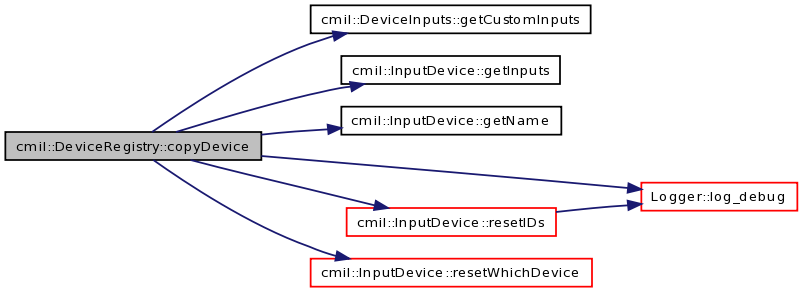
Here is the caller graph for this function:

Definition at line 488 of file InputDevice.cpp.
References getDefaultDevice(), cmil::Ev::getDeviceMultiple(), cmil::Ev::getDeviceName(), cmil::Ev::getName(), Logger::log_debug(), Logger::log_error(), m_index, and cmil::DeviceInputs::use_custom.
00488 { 00489 std::string name; 00490 00491 if((name = event.getDeviceName()) == "") { 00492 name = getDefaultDevice(); 00493 log_debug(std::string("getData() setting name to default: ").append(name)); 00494 } 00495 if(name == "") 00496 log_error("getData() returning null since no default device is available."); 00497 else { 00498 log_debug(std::string("getData() for device name: ").append(name)); 00499 00500 00502 DeviceIndex::const_iterator i = m_index.find(name); 00503 00504 std::ostringstream size_ss; 00505 00506 if(i != m_index.end()) 00507 if(i->second.size() >= event.getDeviceMultiple()) { 00508 size_ss << "getData() number of devices with name: " << i->second.size(); 00509 log_debug(size_ss.str()); 00510 00512 return i->second[event.getDeviceMultiple()].getData(DeviceInputs::use_custom, event.getName()); 00513 } 00514 } 00515 00516 log_error("getData() returning null"); 00517 return NULL; 00518 };
Here is the call graph for this function:
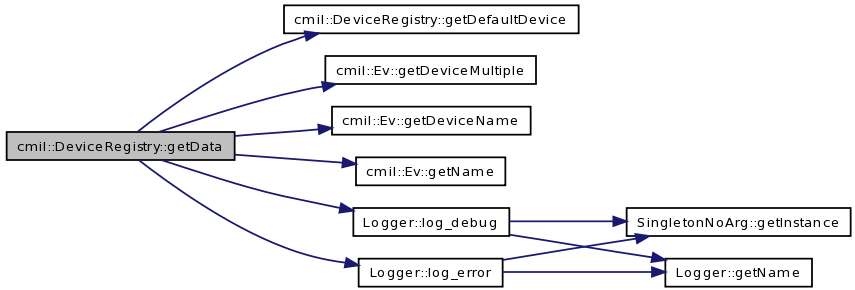
| InputData *const cmil::DeviceRegistry::getData | ( | unsigned int | id | ) | const |
Definition at line 480 of file InputDevice.cpp.
References Logger::log_error(), and m_inputs.
Referenced by cmil::InputArbitrator::getData(), and getID().
00480 { 00481 if(id <= m_inputs.size()) 00482 return m_inputs[id]; 00483 00484 log_error("getData(id) bounds error, returnning NULL"); 00485 return NULL; 00486 };
Here is the call graph for this function:

Here is the caller graph for this function:

| std::string cmil::DeviceRegistry::getDefaultDevice | ( | ) | const |
Definition at line 476 of file InputDevice.cpp.
References m_default_device.
Referenced by getData(), and cmil::InputArbitrator::getDefaultDevice().
00476 { 00477 return m_default_device; 00478 };
Here is the caller graph for this function:

| int cmil::DeviceRegistry::getID | ( | const Ev & | event | ) | const |
In addition to returning and ID, this is used to validate an events structure via deference to getData (return 0 on error)
Definition at line 520 of file InputDevice.cpp.
References getData(), cmil::InputData::getID(), Logger::log_debug(), and Logger::log_error().
Referenced by cmil::InputArbitrator::getID().
00520 { 00521 if(getData(event)) { 00522 log_debug("getID() found data matching event, returning id"); 00523 return getData(event)->getID(); 00524 } 00525 else { 00526 log_error("getID() no id found in registry which matched id"); 00527 return 0; 00528 } 00529 };
Here is the call graph for this function:

Here is the caller graph for this function:

| virtual std::string cmil::DeviceRegistry::getName | ( | ) | const [inline, virtual] |
| int cmil::DeviceRegistry::getSize | ( | ) | const |
Definition at line 531 of file InputDevice.cpp.
References m_inputs.
Referenced by cleanup(), clear(), cmil::SDL::SDLControllers::getDevices(), cmil::SDL::SDLMice::getDevices(), cmil::SDL::SDLKeyboards::getDevices(), and cmil::InputArbitrator::getSize().
00531 { 00532 return m_inputs.size(); 00533 };
Here is the caller graph for this function:
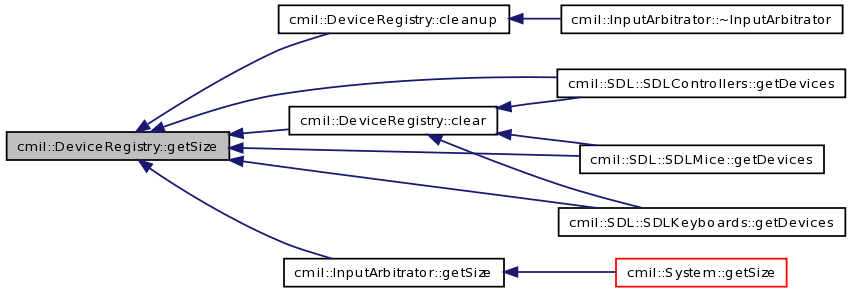
| void cmil::DeviceRegistry::integrityCheck | ( | ) | const |
| void cmil::DeviceRegistry::mergeRegistry | ( | DeviceRegistry & | reg | ) |
This registers each device from the passed registry to this one.
Definition at line 536 of file InputDevice.cpp.
References Logger::log_debug(), m_index, and registerDevice().
Referenced by cmil::SDL::SDLTranslator::addTranslated(), and cmil::InputArbitrator::registerDevices().
00536 { 00537 log_debug("mergeRegistery() "); 00538 for(DeviceIndex::iterator di_iter = reg.m_index.begin() ; di_iter != reg.m_index.end() ; ++di_iter) 00539 for(DeviceMultiple::iterator dm_iter = di_iter->second.begin() ; dm_iter != di_iter->second.end() ; ++dm_iter) { 00540 registerDevice(*dm_iter); 00541 log_debug(std::string("mergeRegistery() calling registerDevice() with name: ").append((*dm_iter).getName())); 00542 } 00543 };
Here is the call graph for this function:

Here is the caller graph for this function:

| void cmil::DeviceRegistry::registerDevice | ( | InputDevice & | dev | ) |
This function should "copy" the device into the registry.
First match the device by name.
None found, add this as a new device, even if their members match some other device, derive/change if you would like different behavior.
Set the first added device as the default device name.
Matched, now ensure a match using the InputDevice::operator==
Definition at line 546 of file InputDevice.cpp.
References copyDevice(), cmil::InputDevice::getName(), Logger::log_debug(), Logger::log_error(), m_default_device, and m_index.
Referenced by cmil::SDL::SDLControllers::getDevices(), cmil::SDL::SDLMice::getDevices(), cmil::SDL::SDLKeyboards::getDevices(), mergeRegistry(), and cmil::InputArbitrator::registerDevice().
00546 { 00547 DeviceIndex::iterator i; 00548 00550 if( (i=m_index.find(dev.getName())) == m_index.end()) { 00553 00554 log_debug(std::string("registerDevice() adding device named: ").append(dev.getName())); 00555 00557 if(m_index.empty()) { 00558 log_debug(std::string("registerDevice() setting default device to: ").append(dev.getName())); 00559 m_default_device = dev.getName(); 00560 } 00561 copyDevice(dev); 00562 } 00563 else { 00565 if ( *(i->second.begin()) == dev) { 00566 log_debug(std::string("registerDevices() registering another device of the same type and name: ").append(dev.getName())); 00567 00568 copyDevice(dev); 00569 } 00570 else { 00571 log_error(std::string("registerDevices() not adding device of the same name and type: ").append(dev.getName()). 00572 append("due to member unequality.")); 00573 } 00574 } 00575 }
Here is the call graph for this function:

Here is the caller graph for this function:

| void cmil::DeviceRegistry::SetInputIDs | ( | InputDevice & | dev | ) |
std::string cmil::DeviceRegistry::m_default_device [private] |
Definition at line 237 of file InputDevice.h.
Referenced by getDefaultDevice(), and registerDevice().
DeviceIndex cmil::DeviceRegistry::m_index [private] |
Definition at line 235 of file InputDevice.h.
Referenced by cleanup(), clear(), copyDevice(), getData(), mergeRegistry(), and registerDevice().
std::vector<InputData* > cmil::DeviceRegistry::m_inputs [private] |
This is used for fast access of the InputData associated with an ID.
Definition at line 240 of file InputDevice.h.
Referenced by copyDevice(), getData(), and getSize().
 1.4.7
1.4.7